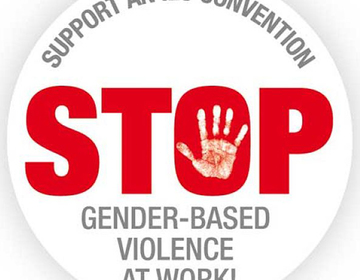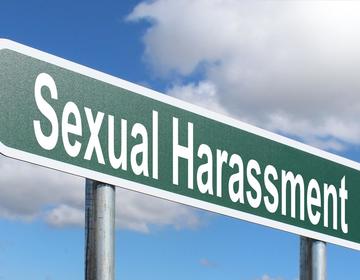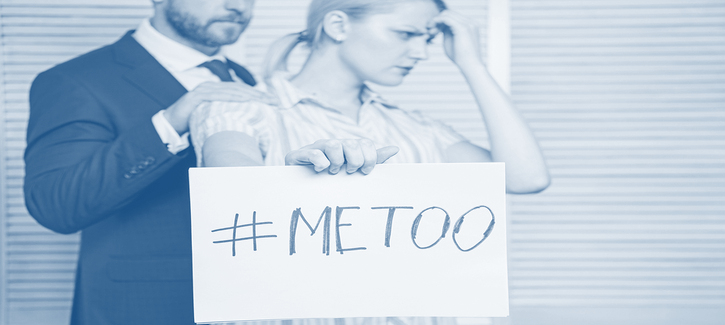Sexual Harassment & Assault - Understanding Your Rights

Here at Benson & Bingham Accident Injury Lawyers, LLC, we understand that sexual harassment and sexual assault are pervasive issues that plague our country on a daily basis. Our home state of Nevada is no different. As such, we believe it is crucial for a victim of sexual harassment or sexual assault to know their rights and understand their options. If you feel that you have been a victim of either sexual harassment or sexual assault, we want you to know that our firm is a safe place for you to come forward—you are not alone in this. We have a team of attorney’s, who are passionate about bringing you the justice you deserve. Any one of them is available to meet and discuss with you in a private and confidential setting. We believe it is important for you to understand that what happened to you… it IS NOT your fault. We want you to feel comfortable telling your story.
SEXUAL HARASSMENT
What is it? How do I know if it happened to me?
Sexual harassment is a form of sex discrimination that violates both Nevada state law and Title VII of the Civil Rights Act of 1964. (See Nevada Equal Rights Commission, Facts about Sexual Harassment) Because sexual harassment laws are governed by both Federal and State laws, a victim can file a claim under either and it is important to talk an attorney about where best to file your claim.
According to the Nevada Equal Rights Commission (NERC) Sexual harassment occurs when an individual has made your workplace environment uncomfortable and has subjrected you to the following:
“UNWELCOME SEXUAL ADVANCES, REQUESTS FOR SEXUAL FAVORS, AND OTHER VERBAL OR PHYSICAL CONDUCT OF A SEXUAL NATURE CONSTITUTES SEXUAL HARASSMENT WHEN SUBMISSION TO OR REJECTION OF THIS CONDUCT, EXPLICITLY OR IMPLICITLY AFFECTS AN INDIVIDUAL’S EMPLOYMENT, UNREASONABLY INTERFERES WITH AN INDIVIDUAL’S WORK PERFORMANCE OR CREATES AN INTIMIDATING, HOSTILE OR OFFENSIVE WORK ENVIRONMENT.”
Similarly, the U.S. Equal Employment Opportunity Commission (EEOC) states that:
HARASSMENT [GENERALLY] BECOMES UNLAWFUL WHERE 1) ENDURING THE OFFENSIVE CONDUCT BECOMES A CONDITION OF CONTINUED EMPLOYMENT, OR 2) THE CONDUCT IS SEVERE OR PERVASIVE ENOUGH TO CREATE A WORK ENVIRONMENT THAT A REASONABLE PERSON WOULD CONSIDER INTIMIDATING, HOSTILE, OR ABUSIVE. ANTI-DISCRIMINATION LAWS ALSO PROHIBIT HARASSMENT AGAINST INDIVIDUALS IN RETALIATION FOR FILING A DISCRIMINATION CHARGE, TESTIFYING, OR PARTICIPATING IN ANY WAY IN AN INVESTIGATION, PROCEEDING, OR LAWSUIT UNDER THESE LAWS; OR OPPOSING EMPLOYMENT PRACTICES THAT THEY REASONABLY BELIEVE DISCRIMINATE AGAINST INDIVIDUALS, IN VIOLATION OF THESE LAWS.
As it pertains to sexual harassment, the EEOC states that “It is unlawful to harass a person (an applicant or employee) because of that person’s sex. Harassment can include “sexual harassment” or unwelcome sexual advances, requests for sexual favors, and other verbal or physical harassment of a sexual nature.” (See, Sexual Harassment)
There are numerous ways in which someone may be subject to sexual harassment. It is important to note that both women and men can be made victims of sexual harassment. Some examples might include:
- Bribery: You are asked/told to exchange sexual favors for a promotion, raise or better position at work. It is important to remember that such an advance is not always straightforward. The sexual advance itself can be explicit and obvious, or it may be implied. Sometimes the suggestion might be made in the manner of a “joke.” The key thing for you to remember is that if you feel that “submission to or rejection of” the advance will directly affect your employment…it is likely sexual harassment.
- Ultimatums: You may feel as if your job is on the line if you don’t perform or engage in certain sexual activities. Maybe a comment was made that lead you to believe if you don’t exchange sexual favors you might suffer the consequences, possibly threats against your job, title or position.
- Unwelcome verbal or physical conduct: This might happen when a co-worker finds an opportunity to catch you alone at work (private rooms, no cameras) and make a pass at you. It might happen when someone touches you inappropriately, or makes inappropriate sexual comments about your body or chastity.
- Threats: Maybe you have a past or flirted with a co-worker previously but now you are saying no or you are simply no longer interested. It happens. But having a history with someone doesn’t give them a free pass to sexually harass you at work. Retaliation sometimes occurs in the form of threats to show private pictures, share intimate texts or intimidate you in some other way.
- 3rd Party Harassment: Meaning, it doesn’t have to be YOU as the subject of the sexual advances or misconduct. According to the NERC, it can be “anyone who is affected by the conduct.”
If I have Been Sexually Harassed at Work, What are My Rights and Options?

Your employer has a duty to create and maintain a safe work environment for you. This means that your employer should take steps to protect you and other employees from sexual harassment. For example, some companies have come under fire in the wave of today’s #metoo movement for creating or facilitating a sexually charged atmosphere that subjects women and men to sexual harassment. The reality of the situation is that legal recourse is available, now more than ever, to the victims of workplace harassment. The EEOC recently published preliminary data for the fiscal year of 2018 relating to sexual harassment lawsuits:
● THE EEOC FILED 66 HARASSMENT LAWSUITS, INCLUDING 41 THAT INCLUDED ALLEGATIONS OF SEXUAL HARASSMENT. THAT REFLECTS MORE THAN A 50 PERCENT INCREASE IN SUITS CHALLENGING SEXUAL HARASSMENT OVER FISCAL YEAR 2017. ● IN ADDITION, CHARGES FILED WITH THE EEOC ALLEGING SEXUAL HARASSMENT INCREASED BY MORE THAN 12 PERCENT FROM FISCAL YEAR 2017. ● OVERALL, THE EEOC RECOVERED NEARLY $70 MILLION FOR THE VICTIMS OF SEXUAL HARASSMENT THROUGH LITIGATION AND ADMINISTRATIVE ENFORCEMENT IN FY 2018, UP FROM $47.5 MILLION IN FY 2017. (SEE, EEOC RELEASES PRELIMINARY FY 2018 SEXUAL HARASSMENT DATA)
It is important to note that sexual harassment is treated much differently, from a legal perspective, than sexual assault. According to the EEOC, incidents of harassment must arise to more than mere annoyance and “to be unlawful, the conduct must create a work environment that would be intimidating, hostile or offensive to reasonable people.” (See, Harassment).
The leading case law on point is a Supreme Court decision from 2013, Vance v. Ball State University, 133 S.Ct 2434. The court in Vance set the framework for workplace harassment claims as follows:
“UNDER TITLE VII, AN EMPLOYER’S LIABILITY FOR SUCH HARASSMENT MAY DEPEND ON THE STATUS OF THE HARASSER. IF THE HARASSING EMPLOYEE IS THE VICTIM’S CO-WORKER, THE EMPLOYER IS LIABLE ONLY IF IT WAS NEGLIGENT IN CONTROLLING WORKING CONDITIONS. IN CASES IN WHICH THE HARASSER IS A “SUPERVISOR,” HOWEVER, DIFFERENT RULES APPLY. IF THE SUPERVISOR’S HARASSMENT CULMINATES IN A TANGIBLE EMPLOYMENT ACTION, THE EMPLOYER IS STRICTLY LIABLE. BUT IF NO TANGIBLE EMPLOYMENT ACTION IS TAKEN, THE EMPLOYER MAY ESCAPE LIABILITY BY ESTABLISHING, AS AN AFFIRMATIVE DEFENSE, THAT (1) THE EMPLOYER EXERCISED REASONABLE CARE TO PREVENT AND CORRECT ANY HARASSING BEHAVIOR AND (2) THAT THE PLAINTIFF UNREASONABLY FAILED TO TAKE ADVANTAGE OF THE PREVENTIVE OR CORRECTIVE OPPORTUNITIES THAT THE EMPLOYER PROVIDED. ID., AT 807, 118 S.CT. 2275; ELLERTH, SUPRA, AT 765, 118 S.CT. 2257.”
Using this framework as a guideline to understanding your rights as a victim of sexual harassment, the key determination is whether or not your harasser was/is a supervisor. A co-worker with no control over your day to day work life will only subject your employer to liability if you, as a Plaintiff, can prove your employer was negligent in controlling your work conditions. According to the EEOC, this means that your employer “will be liable for harassment by non-supervisory employees or non-employees over whom it has control (e.g., independent contractors or customers on the premises), if it knew, or should have known about the harassment and failed to take prompt and appropriate corrective action.”
The supervisory distinction is important because there are severe legal consequences attached to harassment by a supervisor, i.e., “strict liability.” For a Plaintiff, strict liability has a lower evidentiary threshold than Negligence and it makes your case easier to prove.
According to the EEOC, the employer is automatically liable for harassment by a supervisor when “[Harassment] results in a negative employment action such as termination, failure to promote or hire, and loss of wages. If the supervisor’s harassment results in a hostile work environment, the employer can avoid liability only if it can prove that: 1) it reasonably tried to prevent and promptly correct the harassing behavior; and 2) the employee unreasonably failed to take advantage of any preventive or corrective opportunities provided by the employer.” (See, Harassment).
What Steps Should I Take If I have Been Sexually Harassed at Work?

Often times, the work atmosphere isn’t necessarily the problem and it is an individual or group of people that create the problem. If your employer is unaware that the harassment is taking place, they may be unable to take the necessary steps to protect you. Further, as noted above, if you fail to take advantage of preventative or corrective opportunities, your employer may be able to avoid liability. The NERC states that:
“It is helpful for the victim to directly inform the harasser that the conduct is unwelcome and must stop. The victim should use any employer complaint mechanism or grievance system available. Failure to report sexual harassment to the employer may limit the remedies available to the victim.”
Obviously, this might be easier said than done. The point is that you should work up your chain of command or follow the company policy and procedures in place to protect you from workplace harassment. If you don’t feel safe doing so, or your fear the potential repercussion, you should speak with one of our licensed attorney’s at Benson & Bingham today. We are here to help guide you through the process and provide a safe and comfortable outlet for you. Contact us today!
Free Consultation

